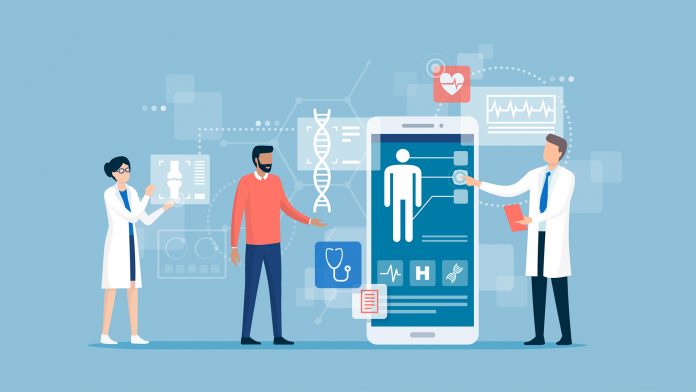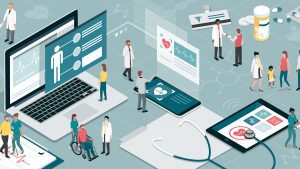
Oliver Bleck discusses the rise of platform ecosystems in healthcare, the value of personalised healthcare and the need for an agile environment to support its adoption.
What could the future of healthcare look like for a child growing up in Europe today? For some time, we have hoped that the next generation will benefit from a more connected Europe that learns from every patient interaction to build a clearer picture of their personal health and care needs, and continually improves services specifically for them.
If we build a more connected Europe with secure access to robust, anonymised health data, we will also be able to reach a deeper understanding of life-changing diseases, such as cancer. We will be able to improve earlier detection and use genomic and molecular insights to advance the next generation of diagnostics and personalised therapies. In the future, Europe can and should be a place where secure access to health data, including the sharing of non-identifiable data for research, innovation, policy-making and regulatory decision making helps everyone lead healthier and more productive lives. It is a future where personalised healthcare can become a reality for all citizens.
In oncology, we are already seeing how advances in our knowledge of cancer genomics, made possible through the growing availability of real-world data sources, are helping pathologists and oncologists to better understand patients’ unique cancer types. Having greater clarity on distinct cancer profiles is significantly improving cancer diagnostics, allowing doctors, together with their patients, to select treatments that target specific mechanisms that cause or contribute to disease. Just as every one of us – from our fingerprints, to our irises, and genetic make-up – is unique, so is every case of cancer. This is why individualised, targeted therapies that represent personalised approaches offer greater hope for cancer patients.
It is not just cancer patients who can benefit. Insights from health data have the potential to transform how many serious diseases are detected, diagnosed, monitored, treated, and even prevented.
Delivering a personalised healthcare approach across Europe requires access to, and sharing of, large robust data sets. In May 2022, we moved closer to this becoming a reality with the European Commission’s publication of the European Health Data Space (EHDS) legislative proposal. This is an important step forward in terms of the European data strategy and a milestone on the road toward establishing a single market for digital and data within the EU. Importantly, the EHDS legislation is designed to target better patient outcomes through better diagnosis and treatment, improved patient safety and improvements in both continuity of care and healthcare efficiency. In addition, the proposal lays the groundwork for better and more sustainable healthcare systems and greater opportunities for research and innovation – all of which, of course, have huge potential to benefit patients.
The EHDS specifically focuses on overcoming the current complexity and lack of harmonisation regarding the standards and processes needed to share and access health data. It seeks to establish a standardised, secure health data ecosystem to allow individuals and their healthcare providers to access electronic health data, whether they are at home or in another European country. This will empower each of us to take a more active and informed role in our health and healthcare through better digital access to our health data, and support free movement by ensuring that our health data can follow us as we move between healthcare providers and across national borders. In addition, the EHDS seeks to unleash the data economy in Europe by creating a genuine single market for digital services and health products and, importantly, by putting in place strict rules and regulations for the use of individuals’ non-identifiable health data. It is only by putting these strict rules in place that it will be possible to realise the potential of the secondary use of health data to fuel advances in R&D, inform policymaking and accelerate the pace of healthcare innovation in Europe.
The move has been welcomed by public and private stakeholders who recognise how a connected data-driven healthcare ecosystem is foundational for delivering the transformative benefits we want to see for individual patients and wider society. We are at the start of an important journey.
The rise of platform ecosystems in healthcare
That journey includes reflecting on the expectations of European citizens when they interact with sectors beyond healthcare. Life is moving rapidly away from a paper-driven world to a digital one, where a wide variety of our data are captured and stored in interconnected local networks or in the cloud. These combine to form a digital ecosystem – an interconnected set of data resources, applications, devices and technologies, that share standardised digital platforms, helping them to work seamlessly together.
Media, banking, retail, and travel organisations routinely access digital ecosystems to better understand our needs and preferences and tailor the services they provide. The same opportunity to better reflect patients’ needs and preferences exists in healthcare, but to realise this opportunity we must build an ecosystem that can safely and securely handle the highly complex nature of health data and accommodate the additional complexities that spring from the way health data are gathered, accessed, and used. Furthermore, the health data ecosystem must be shaped by a robust set of rules, checks and balances to protect patients’ privacy and confidentiality. It is important to recognise that patients will only be willing to share their health data if they are confident that it will be accessed and used securely to benefit their health and the health of others.
A digital healthcare ecosystem could unify the wide variety of health data that are captured throughout an individual’s lifetime. This could include family history, diagnostics, test results, imaging, or monitoring data. The integration of these data into a patient’s electronic medical record would have numerous benefits. Firstly, it would benefit each patient by enabling his or her clinicians to make better, more personalised decisions about their treatment and care. Secondly, it would enable hospital leaders to analyse combined and anonymised data sets to gain insights to improve the efficiency and quality of the healthcare services they are delivering. In this way, an enhanced digital healthcare ecosystem directly benefits both the individuals who contribute data and the wider patient community.

Beyond the formal healthcare or laboratory setting, patients will also have greater opportunities to contribute to the quality and quantity of health data. New applications and wearable technologies that securely share information with clinicians can be a rich source of insight. They offer the opportunity to support timely preventative interventions and ongoing disease management. For example, if you are suffering from diabetes or cardiac arrhythmia, it is better to act on an early warning sign than suffer a major event. These types of data can also help improve an individual patient’s personal experience of care – supporting self-management of chronic illnesses and encouraging deeper engagement with their healthcare team.
Health data security, agility and trust
The EHDS is a unique opportunity for the EU to harmonise existing laws and coordinate the digital transformation in healthcare across Europe. It has the potential to evolve our policy environment by providing common standards and practices, infrastructures, and a governance framework for a data-driven health ecosystem. It is widely hoped that this will break down data silos and smooth out the hard lines between individual nations.
The EHDS proposal is now being considered by the European Parliament and the European Council under the co-decision process and the target is to have the legislation in place by 2025. There is a great deal of work to be done before 2025 and no time to lose; patients and societies are waiting for the benefits that the EHDS will bring and now is the time to take action to accelerate its progress. As the public and private sectors work together to make the promise of the EHDS a reality, it is very clear that we must build trust by bringing patients and the public along on the journey.
The pandemic provided a unique backdrop for people to engage in science and public health, but it also showed that misinformation and disinformation can be a significant challenge. A clear unified voice that addresses the legitimate questions and concerns of the public will be critical.
Health data is a particularly sensitive area, so awareness, understanding and trust in the EHDS will be key to supporting a fully functioning system. We need to educate and upskill people about health data and the EHDS so they can understand what it means for themselves as individuals and their communities and society. We will need to move away from the idea that patients are simply ‘giving up’ their data and shift toward a better understanding of a mutually beneficial exchange. As we consider how best to do this, it is essential that we also consider how we can make the transition toward the EHDS an opportunity to address health inequalities so all patients – and all people – can live healthier, more productive, and happier lives regardless of who they are or where they live. It is imperative that we leave no one behind.
We must clearly and transparently communicate to the public that the EHDS, together with GDPR rights, will give them greater control of their health data, putting them at the centre of their health journey. At the macro level, it could inform discoveries which could lead to treatment breakthroughs and transform disease management. At a micro level, it could empower an individual patient. For example, it will allow them to share information with other health professionals across European borders and enable them to have greater visibility of their health records and the ability to update information and restrict access.
Patients want an integrated healthcare journey and healthcare stakeholders want to enhance the patient experience; effective use of health data will make both possible.
Working today to deliver for tomorrow’s Europe
Let us bring our focus back to our vision of the future of healthcare for a child growing up in Europe today and how we can positively impact their future by working together and using the EHDS as a catalyst for collaboration to redefine tomorrow’s European health landscape. A landscape where a data-driven ecosystem can improve innovation, deliver the value of personalised healthcare, support smarter, more evidence-based decision making and move us toward more resilient, sustainable health systems so that every patient can always count on receiving the best care.
We have already made a critical step toward a healthcare data-driven landscape. The launch of the EHDS, the culmination of collaboration and united ambitions, is a great beginning to the process of changing the way we share and use health data to improve patient care across Europe.
Throughout my career, I have always put science at the service of people, and I am confident a healthcare data ecosystem can take us one step further, as we apply insights to drive cutting-edge discoveries and innovation which will change lives. We have the opportunity to build a patient- and people-centric healthcare system that is organised around the needs of patients rather than the diseases that affect them. Transformation of healthcare is in our hands – let us make it happen together!
Oliver Bleck
Area Head Europe South at Roche
www.roche.com
This article is from issue 22 of Health Europa Quarterly. Click here to get your free subscription today.









